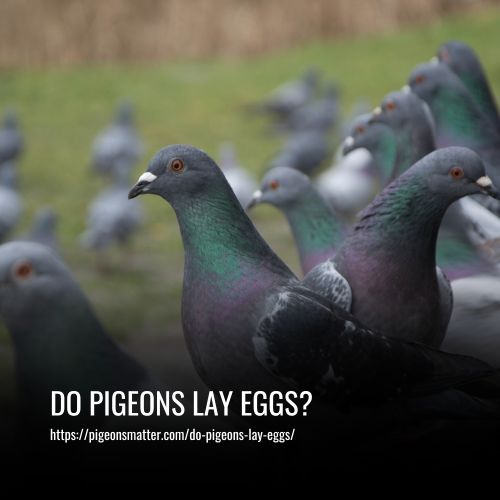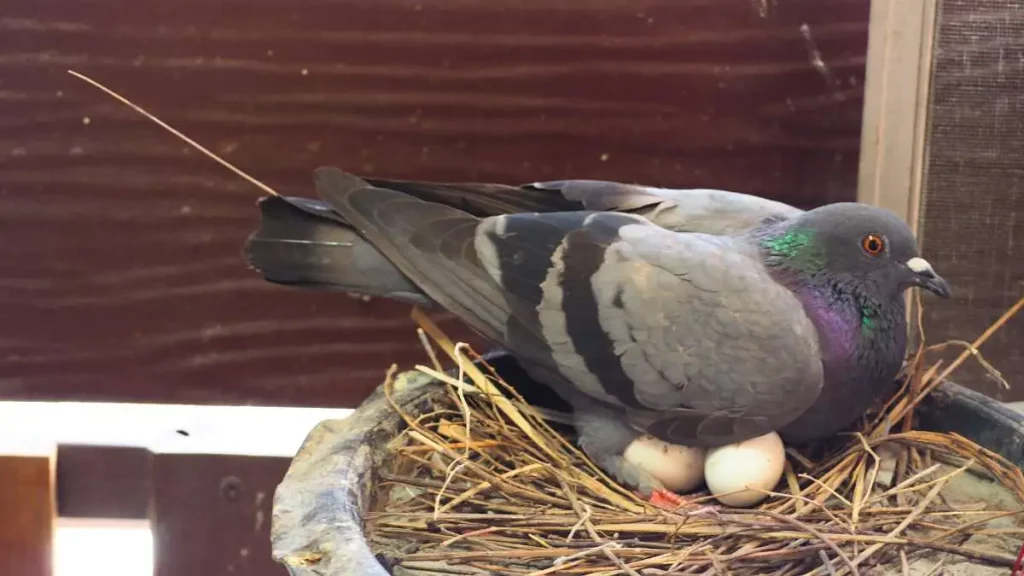Yes, pigeons do lay eggs as part of their reproductive process. Female pigeons typically lay one or two eggs after mating, and both parents take turns incubating them. Pigeons can breed year-round, with spring and summer being the most common seasons. They build nests in various locations, including city buildings and natural cliff ledges, and can breed multiple times in a year.

Egg Laying Process in Pigeons
Pigeons are fascinating creatures that are commonly found in urban areas. Despite what many people believe, pigeons have a diverse diet and are not solely reliant on garbage for sustenance.
It is a known fact that pigeons have monogamous relationships and are capable of producing several offspring annually. If you’re wondering whether pigeons lay eggs, the answer is yes! Pigeons usually lay a pair of eggs that are incubated for around 18 days before hatching. During this time, the parents take turns keeping the eggs warm until the chicks emerge.
The responsibility of caring for the newly hatched chicks falls on their parents, who provide nourishment until the chicks reach an age where they can independently survive. It’s truly amazing to witness the entire process of pigeon reproduction and the dedication of these birds to their young.
What do the Eggs Look Like
Pigeon eggs are usually small and white, but may also be pale blue or brown with spots. It’s important not to remove eggs from parent pigeons without veterinary advice. Research has shown that the color of pigeon eggs can vary depending on the temperature, with differences observed between eggs laid by wild and domesticated pigeons.
Eggs laid in the wild are typically darker and may appear brown to offer more protection and ensure proper incubation. The color of a pigeon’s egg may also provide camouflage, protect against UV rays, and have antimicrobial properties.
It’s important to know what your pigeon’s eggs look like if you plan to breed them, but handling them should be left to the parents. If your pigeons are not exhibiting proper care for their eggs, it may be beneficial to consult with a veterinarian for guidance.
Pigeon Egg Size
Pigeon eggs are generally smaller than chicken eggs, with common pigeon eggs typically measuring between 3 cm to 4 cm in length. Some species of pigeons lay larger eggs, such as King Pigeons. A pigeon egg’s shell is much thinner and more delicate than a chicken egg’s, making them more prone to breakage.
Therefore, it is important to handle pigeon eggs carefully and provide extra precautions while carrying them. Be sure not to press too hard when holding the egg or subject the egg to any added pressure or force that could cause it to crack or break.
When Do Pigeons Lay Eggs
Understanding the egg-laying process of pigeons is important for those who wish to care for them. Here are the steps involved:
1. Nest Preparation
Before laying her eggs, the female pigeon must first prepare a nest. This involves finding a suitable location and gathering materials such as twigs, leaves, and feathers to create a comfortable space for her eggs.
2. First Egg
Approximately 10 to 14 days after mating, the female pigeon will lay her first egg. This typically occurs in the early evening hours, and the egg will be laid directly in the nest.
3. Second Egg
Typically, the female pigeon lays the second egg approximately 44 hours after the first egg. It is common for pigeon nests to have only two eggs, but some may have only one.
4. Incubation
After both eggs have been placed in the nest, the process of incubation commences. During the incubation period, the eggs are alternately cared for by the female during the evening to midmorning, while the male takes over until early evening.
This continues until the eggs hatch, which typically takes around 17 to 19 days. Understanding these steps can help ensure the proper care and well-being of pigeons during this important time.
How Often Do Pigeons Lay Eggs
Pigeons can lay eggs up to 12 times a year, resulting in an average of 24 eggs annually. However, it’s not guaranteed that all the eggs will hatch, and you may end up with fewer eggs than expected. Pigeons in cages tend to lay more eggs than those kept outdoors.
After hatching, the mother pigeon typically prepares to lay eggs again within two weeks. It’s important to give pigeons a break between laying cycles to prevent infertility and protect their health. Separating male and female pigeons for a while can help achieve this goal and ensure healthy baby pigeons.

How Many Eggs Do Pigeons Lay
Understanding the behavior of pigeons during the egg-laying process is important for bird enthusiasts and breeders alike. Pigeons typically lay two eggs at a time, with the second egg being laid within 24 to 48 hours after the first. However, if you observe a pigeon laying three eggs, it is uncommon and the third egg may be smaller and infertile.
The presence of four eggs in a pigeon nest may suggest that both birds are female. In this case, it may be necessary to change the pair by introducing two male pigeons. If you find pigeon eggs on your balcony and are unsure of what to do, seek guidance from a professional or local bird organization to ensure the safety and well-being of the birds.
Do Pigeons Lay Eggs Without Mating
It is possible for female pigeons to lay eggs without mating with a male pigeon. This typically occurs when a female pigeon is unable to find a mature male pigeon to make a pair with. Female pigeons will seek out a suitable location to lay their eggs and will need to mate with a male pigeon for the eggs to hatch properly.
For the successful hatching of eggs, it is necessary for the female pigeon to engage in sexual intercourse with a male pigeon, as it is the male’s sperm that facilitates the hatching process and the subsequent birth of baby pigeons. Despite this, there have been cases where a female pigeon has managed to mate with a male pigeon who already has a pair, resulting in the successful hatching of the eggs.
One owner shared their experience of a female pigeon who had not managed to make a pair with a male pigeon yet but managed to mate with a male pigeon who already had a pair. The female pigeon laid two eggs and successfully incubated them alone, without the help of a male or a partner. The eggs hatched after 17 or 18 days, and the female pigeon raised the baby pigeons on her own.
Overall, while it is possible for female pigeons to lay eggs without mating with a male pigeon, it is important to note that the successful hatching and raising of baby pigeons typically requires a male pigeon and a partner.
FAQs
Both parent pigeons take turns caring for the eggs and hatchlings, with the incubation period lasting around 17-19 days and both parents feeding and caring for the young.
If you find pigeon eggs, it is best to leave them alone as the parents are likely to return. If the eggs appear abandoned after 3 days, it is best to consult a wildlife rehabilitator for further advice.
Pigeon eggs are edible and are considered a delicacy in some cultures, with a taste similar to chicken eggs. However, it is important to ensure that the eggs are handled and cooked properly to prevent any risk of disease.
Fertile pigeon eggs will appear to be opaque and off-white in color. Infertile eggs will be transparent and usually remain unhatched.
If you find a baby pigeon, it’s best to leave it where you found it if it appears to be uninjured and healthy. If it seems to be in distress or injured, it’s best to contact a local wildlife rehabilitation center for advice.
Conclusion
While it may seem like a simple question, “Do pigeons lay eggs?” has a fascinating answer. Not only do pigeons lay eggs, but they do so with incredible speed and efficiency. These hardworking birds are a testament to the wonders of nature, and we can all learn something from their dedication to their young.
So the next time you see a pigeon, take a moment to appreciate all that they do, including laying those precious eggs.


